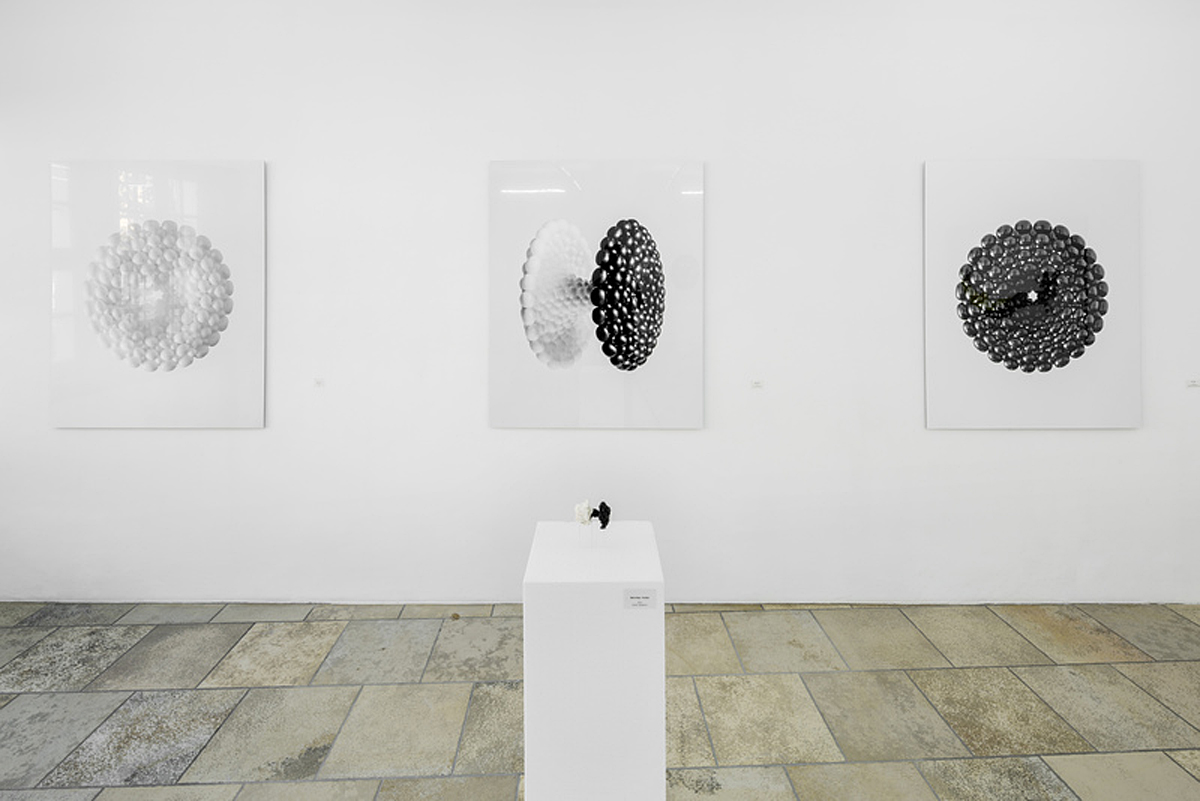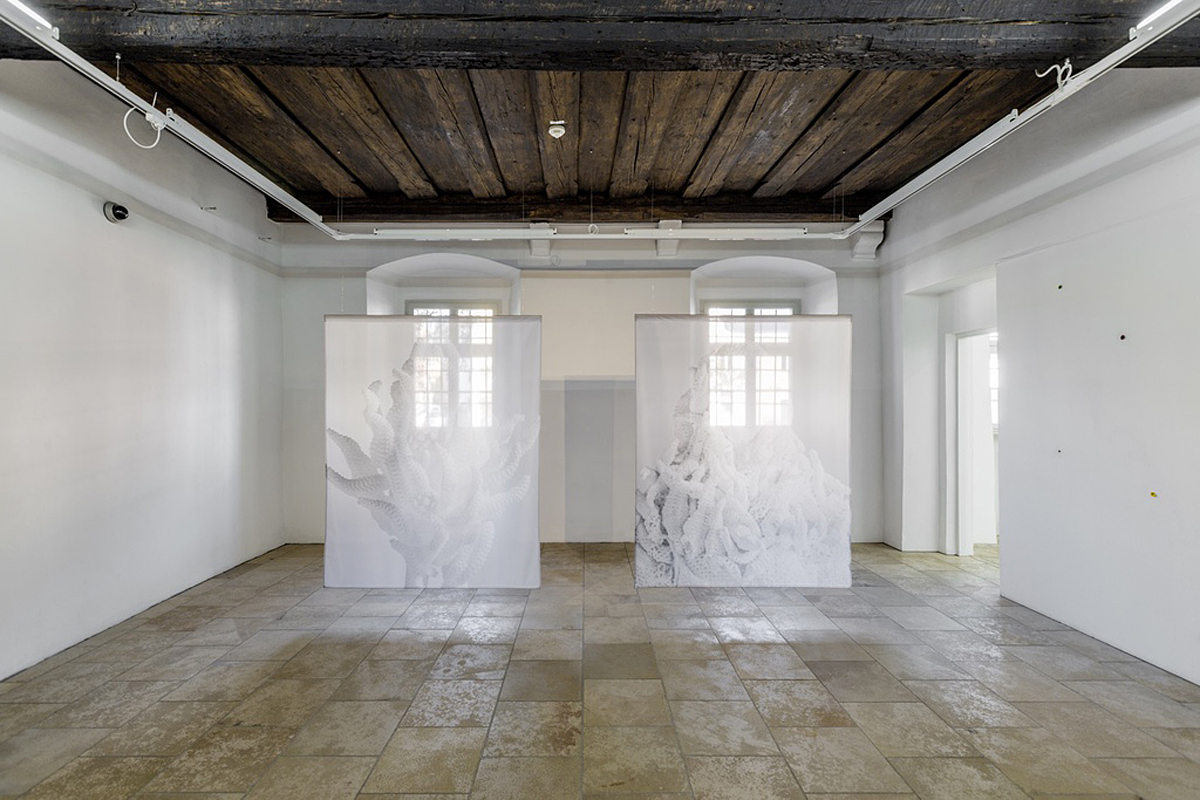I find myself awake several times a year at a time that is neither morning nor night, when white starts to cast over the sky. There is no nightmare, no anxiety, and my consciousness is surprisingly clear in contrast to my body which has not fully awoken, and I slip out of bed wanting to feel the cool air outside. My mind and body are trying to synchronize.
The moment is deeply silent; had I awoken a few moments earlier or later, I may have heard some kind of noise. While most people are sound asleep, there I am, in a strange mood. Morning and night have clear colors, but that strange moment is obscure, as if everything is stopped, waiting for something. I then become very conscious of the present. The past, present and future are a linear continuation, but in that present moment, I am crouched as if waiting indefinitely for the future to come. The bygone past and the present have no color and all sounds have faded, but the future seems to hold some color. I am at the border of present and future as I contemplate my existence.
What am I?
I can ask this question only to the past. My personality is an accumulation of the past. What am I? What is self? I ponder in frustration. Nowadays, every household has a mirror (take a step outside and there are mirrors all around—in storefronts, car windows). I gaze at my reflection but find it hard to believe that “I” really exist. I see an artificial image of me. I see a humorous human searching endlessly for the truth. I see deception.
“I” am the only person in the world who knows who I am, but “I” am also the least capable of seeing myself objectively. You cannot catch “I” by the tail so easily. ”I” may be mankind’s greatest concoction. When we say “I” we speak of none other than ourselves, but at the same time, it reminds us that we are anonymous beings amongst a greater community. Just as I use “I” to speak of myself, others also use “I” to speak of themselves. Unlike a proper noun “I” can be used by anybody.
Historically speaking, now is when we need to be more independent than ever. The faith that unites all individuals has been lost (we destroyed it ourselves) so how are we to define “I” when we are in danger of losing our sense of community?
It is difficult to define “I” but there is one theory that defines it as an individual personality. Let me borrow the words of the psychologist Allport. In his major work “Personality: A Psychological Interpretation” (1937) *1, he writes of personality as “a dynamic organization, inside the person, of psychophysical systems that create the person’s characteristic patterns of behavior, thoughts and feelings.” In other words, personality is a sophisticated system in which each individual is a collection of unique psychological and physical aspects that adapts to the environment and is capable of its own proactive behavior.
This is a great definition of personality. The personality we all have within us is not solid but rather something that flows like water. Personality changes with age and based on social and environmental factors. As a child, I grew up near a river and perhaps this influences my idea that personality is like water. In Japanese ideology, water symbolizes things that flow aimlessly and changes into vapor or ice depending on its environment. This idea underlies the term “we” which is often used in Japan. It makes me think of modern personalities which are dissociative yet have the desire to belong.
As I contemplate, I imagine personality flowing like a river and I want to contain part of it within a capsule. The mass community is a flowing river and the individual personality is the capsule that ebbs and flows within the river. I want to know what the capsule looks like. Its shape could tell me something about its content.
In the moment, neither morning nor night, shrouded in vague color and silence, I close my eyes and try to imagine the capsule within me. Knowing what is inside my capsule could be my saving grace. It could also be a frightening reality. What if my capsule is disfigured and the contents are superficial? I may fall into despair and lose faith in living. But something keeps me searching for the answer. I want to know more than anyone else. So I ask myself.
– Can you show me what is inside the capsule?
My alter ego comes off as rude. I smirk because the answer is not so easy. I respond.
– Even I do not know. That is why I cannot show you.
My alter ego bites his lip with a look of sadness as if to say, “I trusted you and thought you would show me.”
I then feel guilty and apologize.
– Sorry. It is not that I do not want to show you. I just do not know what exactly that capsule is just yet.
I smile faintly and nod.
– When will you show me?
When? I think. I do not know the answer. All I see is a hazy figure when I try to imagine my “self.” So I respond with a vague “someday.” Someday, I will see it, and when I do, I will show you too.
The dazzling morning light fills the room and I finally open my eyes. I start to see it. A shape I had never imagined. It only becomes visible with age, and I let my imagination soar. If I had not lived this long, I would never have seen it. The future me trembles quietly at the thought. To live means to grow old and to approach death. It is violent, nihilistic and sad, but my obscure capsule will someday become visible. I will then peek inside it again and wonder what it contains. I hope what I see is pleasant because that would mean I am no longer searching for “I.” By then, I will have found contentment as an equal member of the unified mass. It is not a certainty but I believe that is how things will pan out. The future, like a river that flows into the vast ocean, is a continuation of the past and present, and I am going along to that flow. The glimmer of light and color that burrows in the deep silence of this moment, of neither morning nor night, gives me hope.
*1 Allport, G.W. (1937) Personality: A psychological interpretation. New York: Holt, Rinehart. & Winston.
translator: hamada
一年間に数回ほど朝とも夜ともつかない時刻に目覚める時がある。空が白み始まる少し前の時間帯だ。悪夢に苛まれた訳でもないし、心配事がある訳でもないが、不思議とそういう時には、覚醒しきっていない身体とは裏腹に、驚くほど意識が明瞭で、ベッドから抜け出し、カーテンを開けて冷たい外気に触れてみたくなる。おそらく意識と肉体を同期させたいのだろう。
もう少し早く目覚めたり、遅く目覚めれば何かしらの音が聴こえるのだろうけれども、その時間帯は驚くほど深い静けさに包まれている。ちょうど誰もが深い眠りについている時間なのだろうけれども、とても不思議な心持ちになる。色についてはどうだろうか。朝も夜も明確な色があるが、その時間帯は曖昧な色に包まれている。すべてが停滞し、何かを待っているような。そういう時、私は現在という時間を明瞭に意識することになる。過去と現在と未来が一直線に陸続きになっていて、私はちょうど現在に蹲り、未来をひたすら待っているような気がするのだ。過ぎ去った過去と現在は色も明るさもなく、音も消え去っているが、未来は漠とした色彩があり、明るさがある。私はちょうどその狭間にいて、自分自身が何者であるか問いかける。
私は何ものであるのか。
こうした問いかけを向けることができるのは過去である。過去の集積が現在の私の人格をかたちづくっているからだ。私とは何か? あるいは自我とは何か? という問いは、時に私を苦しめる。どこの家庭にも鏡が置かれるようになり(ショーウィンドウのガラスに、車の窓、一歩外に出たとしてもそこは鏡だらけである)、自身の姿を映し出すことができるが、鏡像を眺めても私はそこに「私」がいることを信じることができない。そこに映る「私」はどこかポーズをとっていて、本質的な「私」がそこにはいないように感じるからだ。私は鏡に映る自分がひどく滑稽な人間として映り、その本質を常に探して求めているように感じられる時がある。そこにはある種の偽りがあるように思うのだ。
世界の中で最も「私」という人間を知ることができるのは、私に他ならないかもしれないが、最も客観的に見ることができないのも私である。「私」というものは、どうやらそう簡単に尻尾を掴ませてもらえるものではないようだ。そもそも「私」という言葉は人間が発明した最大の虚構であると言えるのかもしれない。「私」という言葉を使う時、それは他ならぬ個を現しているが、同時に巨大な集合体の一部であるかのような匿名性を持つことにもなる。私が何かを主張する時、当たり前のように自身のことを「私」と呼ぶように、他者もまた自身のことを「私」と呼ぶ。固有名詞と異なって、「私」という言葉は誰にでも使用することができる。
おそらく歴史に鑑みても、これほどまでに個であらねばならなかった時代はないのではないだろうか。個を統括する神を失い(自分たちで殺めてしまったことは周知の事実だろう)、集合体であるコミュニティを失いつつある私たちはいったい「私」というものをどう定義付ければ良いのだろうか。
「私」という存在を定義付けるのは難しいことだが、ひとつの指標として個人として独立しうる資格である人格という概念がある。心理学者であるオルポートの言葉を借りよう。彼は大著 “Personality: A Psychological Interpretion”(1937) *1 でこう書いている──人格とは「個人の環境への適応を決定するような心理的身体的な諸々のシステムからなる、個人の中の力動的組織である」。つまりオルポートは人格の定義として、人格は人間を構成するさまざまな心理的・身体的な要素を統括する上位システムであり、それは個人個人別個のものであり、さらに個人は環境へ適応するが、それは受動的なものではなく、自らその意味を変革していく能動性をもつものだと主張している。
見事な人格の定義だが、こうした概念が個別のものとして確かに私たちに備わっていると仮定した時、私にはそれが固形物ではなく常に流動的な水のようなものに思えてくる。人格とは年齢を重ねることで、あるいは社会変化、環境変化によって常に変容を遂げていくものである、と考えるからだ。人格が水のようなものだと感じる理由は、おそらく、幼少の頃、川が身近なものだったことも関係しているのかもしれない。水は日本的な思想観で言えば、日本人がよく使う「私たち」という意識の根底にあるものであり、移ろいゆくものの象徴であり、環境によって水蒸気や氷などさまざまな状態変化を見せるものだ。私はそこに現代人が持つ人格の解離性と統一性のようなものを見るのである。
そのような思索の輪をくぐり抜けていくと、私はその水のような流動的な人格を何かの容れ物で掬い取ってみたくなる。人格が常に揺れ動く連続性を持ち、且つ、水のように巨大な集合体の一部でもあると仮定するならば、ある器に入れたその水の断片こそ、私を「私」とする自我に相当するのかもしれない。その為に、私はその容れ物である「器」のかたちを模索する。そのかたちがわかれば、中身も少しは想像できるのではないだろうか。
私は朝とも夜ともつかない曖昧な色と音の狭間で目を瞑り、自身の中に存在している筈の「器」のかたちを描き出そうとしてみる。その「器」に何が入っているのか、私は気になっているし、それを発見することで私は救われるような気がする。しかし、それは同時に恐ろしいことでもある。もしも、その「器」が醜く、収まっているのが浅薄なものだったのなら。私は落胆し、生きる意味を見失ってしまうかもしれない。けれども、私は何ものなのか、という思索を止めることはできない。私は誰よりもそのことを知りたいのだ。だから私は自分に問いかける。
─ ねえ、器の中のものを見せてくれないか?
私はもうひとりの私を不躾な奴だと思う。そのようなことを簡単にできる訳がないと鼻で嗤いさえする。私はこう答える。
─ 私にもわからない。だから見せることはできない。
私は寂しそうに下唇を噛む。あなたを信じていて、あなたなら見せてくれると思ったのに、という表情。
私は急に後ろめたい気持ちになって、謝罪をする。
─ ごめんね。あなたに見せたくない訳ではないんだ。ただ私はまだその器自体がどのようなものかわからないんだ。
私は僅かに微笑む。頷く。
─ いつになったら見せてくれる?
私は考える。いつになったら? そんなことは私にもわからない。私は私自身を思い描くと、何か曖昧な靄のようなもので覆われているような気がしてしまう。だから、お茶を濁して、いつか必ずと言葉をつぐ。いつか必ずかたちが見えてくる。そうしたらあなたにも見せてあげる。
目もくらむほどの朝の光が辺りを満たしはじめて、私はようやく瞼を開ける。やがて、ゆっくりとかたちがあらわれてくる。私も知らなかったかたち。年齢を重ねてようやくわかるのだろう、と私は想像を飛躍させる。もしも、私が年齢を重ねなかったら、それを見ることはできなかったかもしれない。そう思うと、未来の私は静かな感動で打ち震えている。年齢を重ねることは老いることであり、そして、死に近づくこと。それは暴力的で、虚無的で、悲哀が含まれる反面、私はかつて不明瞭だった器のかたちをこの目で見ることができるようになる。その時、私はその器の中をあらためて覗き込むだろう。中には何が入っているだろうか。なるべく豊かな光景を見たいものだ。もしも、その光景が素晴らしいものであれば、その時にはすでに、私は「私」が何ものであるか、という問いすら忘れ去っているだろう。つまり、私は「私」であることを意識すらしなくなり、水の在り方のように全体の一部として、他者と自分を等価なものとして見ている筈だ。全くもって確証はないが、私はそうなるだろうという予感がある。未来は、川の水が大海に流れるように、過去から現在へ伸びる時の連続性であり、私はその巨大な流れに乗っている。朝とも夜ともつかない時刻の静寂さの中にひっそりと潜む、これから現れ出るであろう、或る明るさと色彩が私にそう期待させる。
*1 Allport, G.W. (1937) Pesonality: A psychological interpretation. New York: Holt, Rinehart. & Winston.
–
Exhibition – Daisy Balloon “CAPSULE” | LUFTMUSEUM
Date: 9.24,2016-1.17.2017
Venue: LUFTMUSEUM
LUFTMUSEUM e.V.
AIR MUSEUM Eichenforstgaeßchen 12 92224 Luftkunstort Amberg/Germany
http://www.luftmuseum.de


